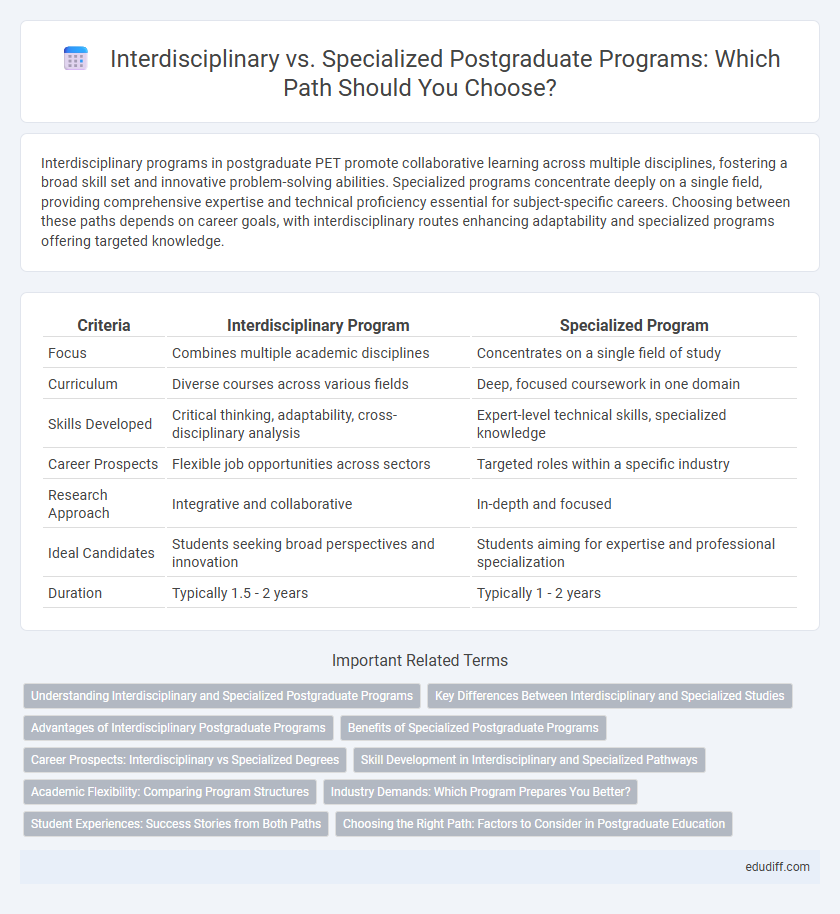Interdisciplinary programs in postgraduate PET promote collaborative learning across multiple disciplines, fostering a broad skill set and innovative problem-solving abilities. Specialized programs concentrate deeply on a single field, providing comprehensive expertise and technical proficiency essential for subject-specific careers. Choosing between these paths depends on career goals, with interdisciplinary routes enhancing adaptability and specialized programs offering targeted knowledge.
Table of Comparison
| Criteria | Interdisciplinary Program | Specialized Program |
|---|---|---|
| Focus | Combines multiple academic disciplines | Concentrates on a single field of study |
| Curriculum | Diverse courses across various fields | Deep, focused coursework in one domain |
| Skills Developed | Critical thinking, adaptability, cross-disciplinary analysis | Expert-level technical skills, specialized knowledge |
| Career Prospects | Flexible job opportunities across sectors | Targeted roles within a specific industry |
| Research Approach | Integrative and collaborative | In-depth and focused |
| Ideal Candidates | Students seeking broad perspectives and innovation | Students aiming for expertise and professional specialization |
| Duration | Typically 1.5 - 2 years | Typically 1 - 2 years |
Understanding Interdisciplinary and Specialized Postgraduate Programs
Interdisciplinary postgraduate programs integrate knowledge and methodologies from multiple disciplines to foster innovation and complex problem-solving skills. Specialized postgraduate programs focus deeply on a single field, providing expertise and advanced technical skills tailored to specific career goals. Understanding the differences helps students align their academic pursuits with their career aspirations and research interests.
Key Differences Between Interdisciplinary and Specialized Studies
Interdisciplinary programs integrate knowledge and methods from multiple disciplines to address complex problems, fostering critical thinking and innovation, whereas specialized programs concentrate deeply on a single field, building expertise and advanced skills within that discipline. Interdisciplinary studies promote collaboration and adaptability across various domains, while specialized studies emphasize mastery and technical proficiency. Key differences lie in curriculum structure, skill development, and career outcomes, with interdisciplinary graduates often suited for multifaceted roles and specialized graduates prepared for targeted professional paths.
Advantages of Interdisciplinary Postgraduate Programs
Interdisciplinary postgraduate programs enhance critical thinking by integrating diverse academic perspectives, promoting innovative problem-solving skills crucial in complex real-world scenarios. These programs foster adaptability and collaboration, equipping graduates to navigate and influence multiple fields and industries effectively. Exposure to varied methodologies and knowledge bases increases employability and prepares students for leadership roles in dynamic, multifaceted environments.
Benefits of Specialized Postgraduate Programs
Specialized postgraduate programs offer in-depth knowledge and advanced skills tailored to a specific field, enhancing career prospects and expertise. These programs provide targeted research opportunities, fostering innovation and mastery in niche areas. Graduates of specialized tracks often experience higher employability and recognition within their industry due to their focused competencies.
Career Prospects: Interdisciplinary vs Specialized Degrees
Interdisciplinary postgraduate programs equip graduates with versatile skills and broad knowledge applicable across multiple industries, enhancing adaptability in dynamic job markets. Specialized programs deliver deep expertise in targeted fields, often leading to roles that demand specific technical competencies and higher chances of advancement within niche sectors. Career prospects vary as interdisciplinary degrees foster innovation and leadership potential, while specialized degrees typically result in increased employability in specialized professions such as engineering, medicine, or law.
Skill Development in Interdisciplinary and Specialized Pathways
Interdisciplinary postgraduate programs foster a broad skill set by integrating knowledge from multiple fields, enhancing adaptability and innovative problem-solving. Specialized programs prioritize deep expertise in a specific domain, developing advanced technical skills and focused analytical capabilities. Choosing between these pathways depends on career goals that favor either versatile skill development or concentrated mastery.
Academic Flexibility: Comparing Program Structures
Interdisciplinary postgraduate programs offer academic flexibility by integrating multiple disciplines, allowing students to tailor their studies to diverse interests and emerging fields. Specialized programs focus on deep expertise within a single field, featuring structured curricula that advance comprehensive knowledge and technical skills. The choice between these program structures impacts career pathways, research opportunities, and skill development in postgraduate education.
Industry Demands: Which Program Prepares You Better?
Industry demands increasingly favor interdisciplinary programs for postgraduate education due to their emphasis on cross-functional skills, adaptability, and innovation, aligning with the complexity of modern workplace challenges. Specialized programs offer deep expertise in a specific field, which remains crucial for roles requiring advanced technical knowledge and precision. Employers seek candidates who balance specialized knowledge with interdisciplinary adaptability, making programs that integrate both perspectives highly valuable for career readiness.
Student Experiences: Success Stories from Both Paths
Students in interdisciplinary postgraduate programs often report enhanced problem-solving skills and adaptability due to their exposure to multiple fields, leading to innovative research outcomes. Specialized program graduates frequently highlight deep expertise and recognition within a specific domain, facilitating targeted career advancement and industry connections. Success stories from both paths demonstrate that tailored support, mentorship, and real-world application opportunities critically influence student achievements and satisfaction.
Choosing the Right Path: Factors to Consider in Postgraduate Education
Choosing between an interdisciplinary program and a specialized program in postgraduate education depends on career goals, desired skill sets, and industry demands. Interdisciplinary programs foster innovation by integrating knowledge from multiple fields, ideal for roles requiring adaptability and broad analytical abilities. Specialized programs offer deep expertise and advanced technical skills, tailored for professions demanding focused mastery and research proficiency.
Interdisciplinary Program vs Specialized Program Infographic

 edudiff.com
edudiff.com